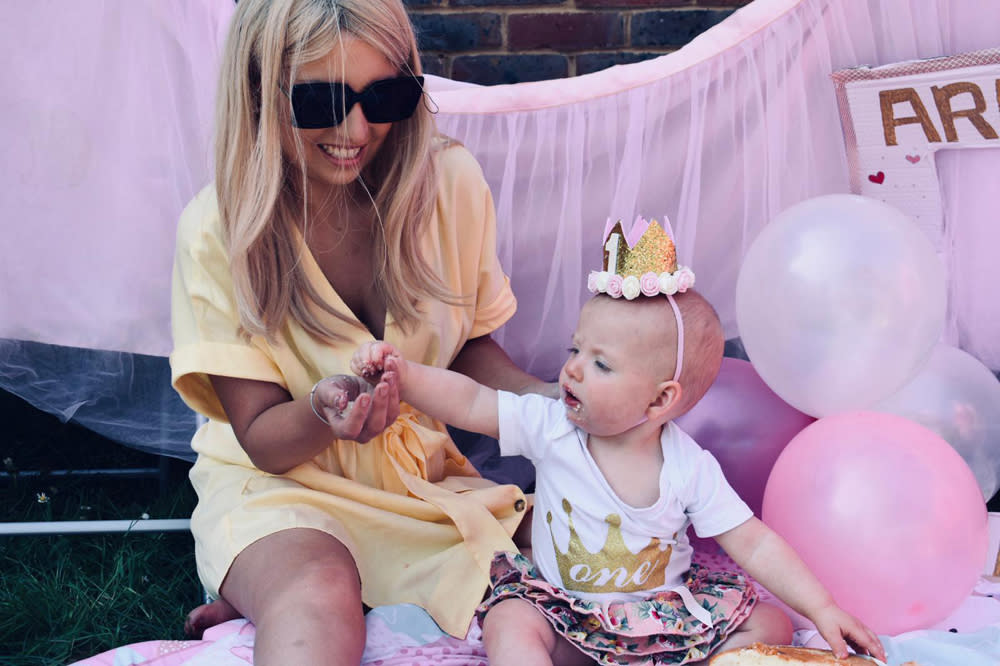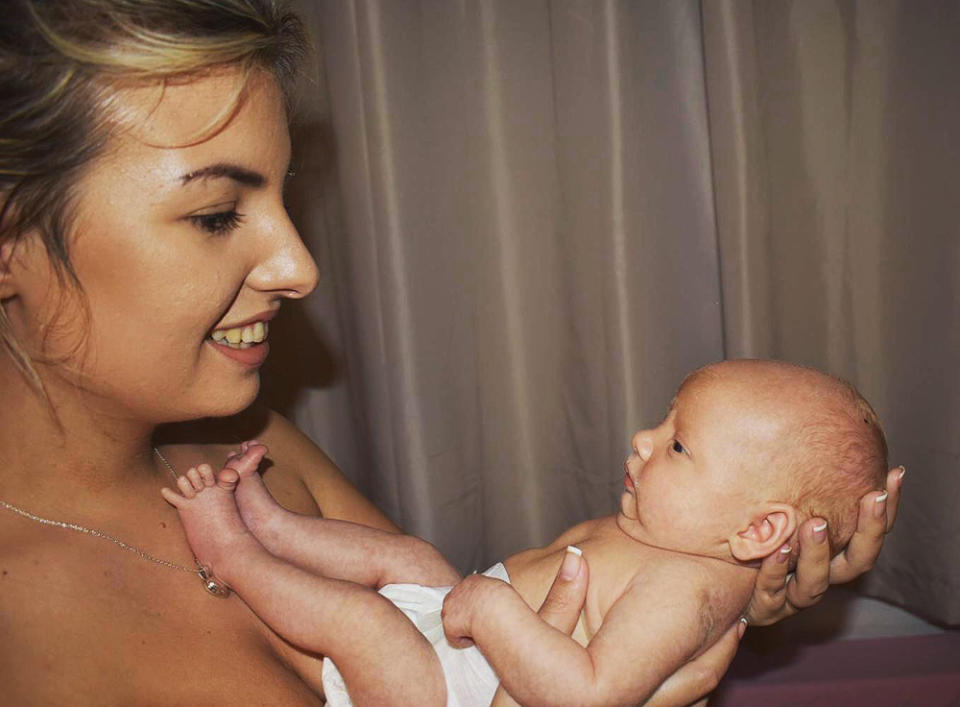Woman diagnosed with cancer 48 hours before giving birth after ‘spot’ turned out to be 10 cm tumour

A woman was diagnosed with cancer just 48 hours before giving birth after a ‘spot’ on her nose turned out to be a 10 cm tumour.
But after almost a year of gruelling treatment, she was overjoyed to be able to celebrate her little girl’s first birthday.
Poppy Stewart-Brown, 24, was originally told the headaches and nosebleeds she was suffering during pregnancy were common side effects.
But two days before giving birth to her daughter, Arabella, she discovered that a painful ‘spot’ on the left side of her nose was actually a tumour that had been silently growing from her jawbone and causing her symptoms.
Doctors revealed she had Ewing sarcoma, a rare form of cancer diagnosed in only 600 people in the UK each year, according to the NHS.
Read more: Parents spot baby's eye cancer in picture taken with a flash

Beauty therapist Stewart-Brown, from Cuckfield, West Sussex, first discovered she was pregnant in October 2018 after her first holiday with her partner Tommy Bolger, 27, a gas engineer.
But, within a month, she started having frequent headaches and nosebleeds, which doctors said were common and attributed to the swell of hormones.
Despite finding clots in her nosebleeds and going to casualty because of her headaches, the mum-to-be believed she was simply having a difficult pregnancy.
“Every time [I went to A&E], they did lots of tests to make sure Arabella was okay, which she was.
“Everyone was baffled. There were no obvious signs of what was causing me to feel quite so awful, so everybody thought it was just a reaction to the pregnancy.”
Read more: The impact coronavirus lockdown could be having on new parents' wellbeing
Then, in February 2019, Stewart-Brown found a spot on the left side of her nose and, after a cream doctors gave her had no effect, she was referred to an ear, nose and throat specialist.
At her March 2019 appointment, a scan revealed a mass in her jaw, that had grown up towards her nose, causing the spot.
“I had faith that I would be okay,” said Stewart-Brown, adding that doctors did not, initially, think it was cancerous. “I was only 23 and, before this, had been completely fit and healthy. Nobody ever expected it would be something so sinister.”

Read more: Labour MP holds baby while making a speech in parliament
But things escalated when she was rushed to A&E just before the Easter bank holiday with a blinding headache and struggling to breathe out of her left nostril.
A biopsy of the spot revealed the mass in her jaw was a 10 cm tumour and, at 34 weeks pregnant, Stewart-Brown had Ewing sarcoma, a cancer affecting the bones and their surrounding tissue.
“Cancer is not something I’d been exposed to much before this, so it never crossed my mind that I could have it,” Stewart-Brown recalls.
“I honestly thought I was just reacting very badly to being pregnant.
Usually occurring in bones like the hips, thigh, and shin – though occasionally found in soft tissue – symptoms of Ewing sarcoma, according to the NHS, include pain, swelling and tenderness in the affected area, a fever, severe tiredness and weight loss.
“The consultant was speaking in doctor language. I told him I didn’t understand, then it dawned on me that he was saying I had cancer,” she says.
“It sounds strange now, but because I already knew Arabella was okay from all the extra tests they’d been doing, the first thing I said was, ‘Am I going to lose my hair?’
“It was the only thing I could think of to associate with a cancer patient.”
Read more: Millie Mackintosh reveals new baby’s name and talks motherhood
That same day, Stewart-Brown was linked up with the charity CLIC Sargent, who assigned her a social worker to support her through the months ahead.
And, just 48 hours later, on 26 April, she delivered Arabella six weeks early.
At just 4lb 4oz (1.9 kg), she was tiny, but healthy and after being taken to neonatal intensive care she soon began to thrive.
But her mother faced a five-hour operation just three days later, during which surgeons removed as much of the tumour as possible.
Unfortunately doctors could not reach its roots, which were wrapped around her jawbone, meaning the new mum would require further treatment.

Read more: Mum’s quest to find 'good Samaritan' who helped when she went into labour in car park
Recovering for eight days in Royal Sussex County Hospital, baby Arabella was a few floors away on a different ward.
“Tommy was amazing and would wheel me down to see her, but it wasn’t the same as being able to cuddle her whenever I wanted to,” she said.
“Those first days of Arabella’s life were so different to what I’d anticipated. My mother’s instinct was to hold and cradle her, but cancer took that from me.
“I couldn’t bear to hear the other mums with their babies on the ward. It broke my heart.”
After being discharged on May 6, Stewart-Brown had a three-week break before beginning the first of 14 rounds of chemotherapy at the Royal Marsden in Sutton, south London.
Though her partner and Arabella visited regularly, the new mother found it difficult mentally.
“I couldn’t come to terms with my diagnosis,” she says. “I had seen cancer patients on TV and in ad appeals, but it’s so different to be living it. I couldn’t help but think, ‘Why me? What did I do to deserve this?’”
Stewart-Brown also struggled physically with the side-effects of chemotherapy, which often left her too exhausted to look after Arabella.
“I wanted to be able to feed her, change her nappy and bathe her. But at times, I’d be so exhausted that if somebody said to me, ‘I’ll give you £1m to make her a bottle,’ I wouldn’t have been able to do it.
“I was so lucky with the incredible support I got from Tommy and our families, but I worried in case my bond with my baby would be impacted.”
In October 2019, the new mum also began proton beam therapy – a pioneering form of radiotherapy, which uses a beam of protons, or positively charged particles to target tumours precisely, reducing the damage to healthy surrounding tissue.
She had 31 sessions, alongside chemotherapy, at Manchester’s Christie Hospital, where the family relocated for a couple of months.
“The treatment left me weak, exhausted and scarcely able to eat,” she reveals. “It was awful, but we tried to snatch some happy moments too, and take Arabella for days out around the city when we could. For those brief moments, I could feel like a mum rather than a cancer patient.”

Read more: Mum shares heartbreaking pictures of baby recovering from lifesaving heart surgery
At the end of February 2020, after her final chemotherapy, doctors told Stewart-Brown they believed her tumour had gone and that there were no signs of the cancer being active again elsewhere in her body.
She has to wait a little longer before receiving an official all clear, but, for now, doctors are happy with her progress and will continue to monitor her with scans.
But her biggest milestone was celebrating Arabella’s first birthday on April 26.
Although in lockdown, the family made the day as special as possible with cake, balloons and banners and plan to have a proper party when restrictions are eased.
Stewart-Brown is opening up about her experience to raise awareness of sarcoma and to thank CLIC Sargent.
“From day one, CLIC Sargent have been incredible,” she says. “They even helped with little things like providing vouchers to pamper myself with, and with practicalities I didn’t have the headspace to think about, such as hospital parking. It was a horrible time, but they were there throughout – not just for me, but for my family.”

CLIC Sargent CEO Rachel Kirby-Rider is now appealing for help, as the organisation’s income has been impacted by COVID-19.
“Since the coronavirus hit the UK our income fell off a cliff, an instant 60% drop,” she says. “We face losing £8 million – which for a charity of our size is devastating.
“Many families we support were already at financial breaking point before the pandemic and things are getting tougher for them.
“Since the start of the coronavirus outbreak in the UK, CLIC Sargent has given out over £45,000 in hardship grants to families in crisis struggling to afford the essentials such as food and paying bills.
“Cancer doesn’t stop for coronavirus and the young cancer patients and families we support are facing a real crisis and need us more than ever. We urgently need funding to do that.”
To support CLIC Sargent and donate, click here
Additional reporting PA Real Life.



